Workplace Surveillance: Impact on Employee Performance and Behavior
VerifiedAdded on 2023/06/12
|10
|2856
|171
Essay
AI Summary
This essay examines the pervasive nature of workplace surveillance in modern organizations and its effects on employee performance and behavior. It discusses various surveillance techniques, including computer software monitoring, email and telephone surveillance, and the use of wearable technology. The essay explores the justifications for employee monitoring, such as safeguarding employee interests and measuring performance, while also acknowledging concerns about privacy rights and the potential for intrusive practices. It delves into the ethical dilemmas associated with electronic performance monitoring, particularly in call centers, and highlights the importance of balancing surveillance with data privacy. Furthermore, the essay references theories like Taylorism and Foucault's Panopticon to provide a framework for understanding the impact of surveillance on employee discipline and motivation, concluding that while surveillance can enhance productivity, it also poses risks to employee morale and autonomy.
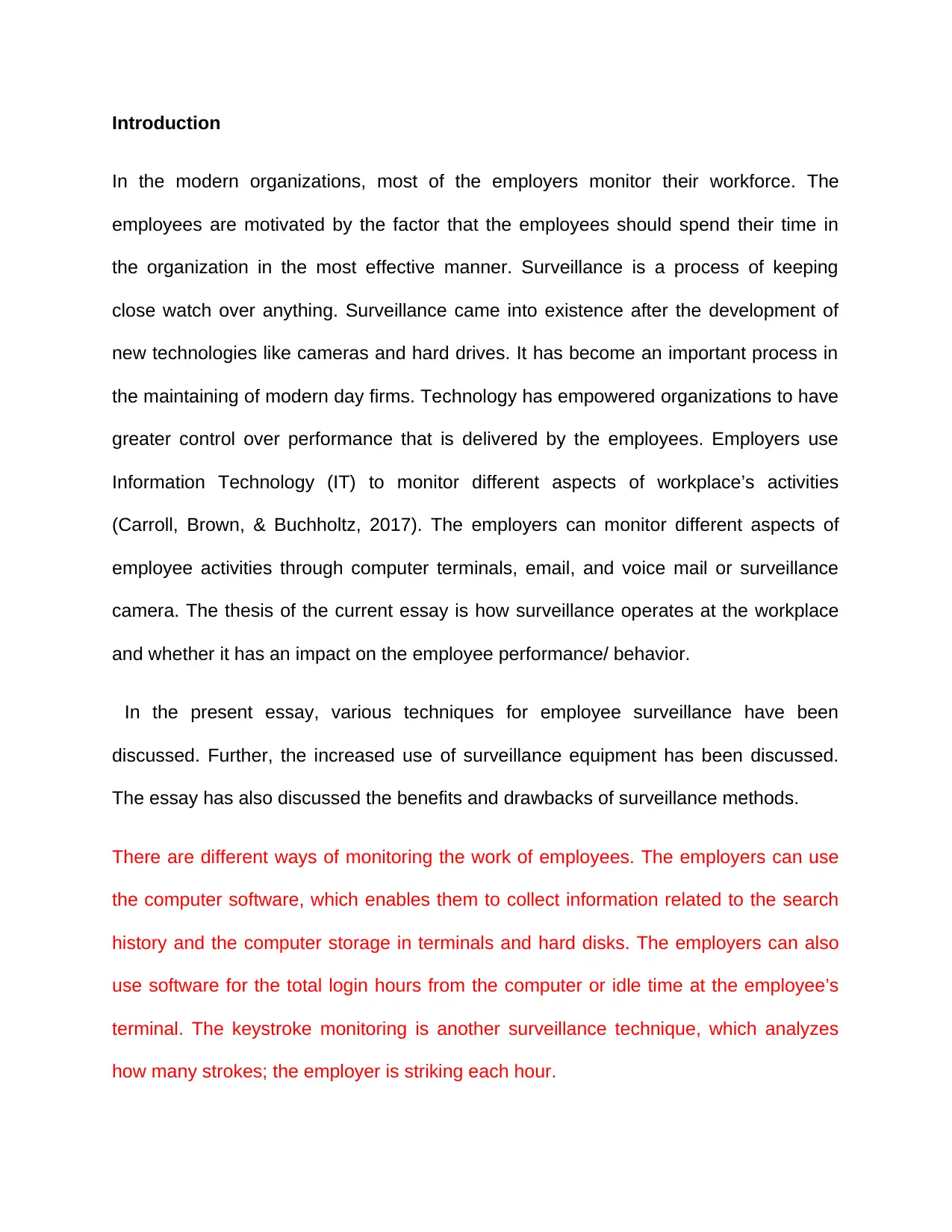
Introduction
In the modern organizations, most of the employers monitor their workforce. The
employees are motivated by the factor that the employees should spend their time in
the organization in the most effective manner. Surveillance is a process of keeping
close watch over anything. Surveillance came into existence after the development of
new technologies like cameras and hard drives. It has become an important process in
the maintaining of modern day firms. Technology has empowered organizations to have
greater control over performance that is delivered by the employees. Employers use
Information Technology (IT) to monitor different aspects of workplace’s activities
(Carroll, Brown, & Buchholtz, 2017). The employers can monitor different aspects of
employee activities through computer terminals, email, and voice mail or surveillance
camera. The thesis of the current essay is how surveillance operates at the workplace
and whether it has an impact on the employee performance/ behavior.
In the present essay, various techniques for employee surveillance have been
discussed. Further, the increased use of surveillance equipment has been discussed.
The essay has also discussed the benefits and drawbacks of surveillance methods.
There are different ways of monitoring the work of employees. The employers can use
the computer software, which enables them to collect information related to the search
history and the computer storage in terminals and hard disks. The employers can also
use software for the total login hours from the computer or idle time at the employee’s
terminal. The keystroke monitoring is another surveillance technique, which analyzes
how many strokes; the employer is striking each hour.
In the modern organizations, most of the employers monitor their workforce. The
employees are motivated by the factor that the employees should spend their time in
the organization in the most effective manner. Surveillance is a process of keeping
close watch over anything. Surveillance came into existence after the development of
new technologies like cameras and hard drives. It has become an important process in
the maintaining of modern day firms. Technology has empowered organizations to have
greater control over performance that is delivered by the employees. Employers use
Information Technology (IT) to monitor different aspects of workplace’s activities
(Carroll, Brown, & Buchholtz, 2017). The employers can monitor different aspects of
employee activities through computer terminals, email, and voice mail or surveillance
camera. The thesis of the current essay is how surveillance operates at the workplace
and whether it has an impact on the employee performance/ behavior.
In the present essay, various techniques for employee surveillance have been
discussed. Further, the increased use of surveillance equipment has been discussed.
The essay has also discussed the benefits and drawbacks of surveillance methods.
There are different ways of monitoring the work of employees. The employers can use
the computer software, which enables them to collect information related to the search
history and the computer storage in terminals and hard disks. The employers can also
use software for the total login hours from the computer or idle time at the employee’s
terminal. The keystroke monitoring is another surveillance technique, which analyzes
how many strokes; the employer is striking each hour.
Paraphrase This Document
Need a fresh take? Get an instant paraphrase of this document with our AI Paraphraser
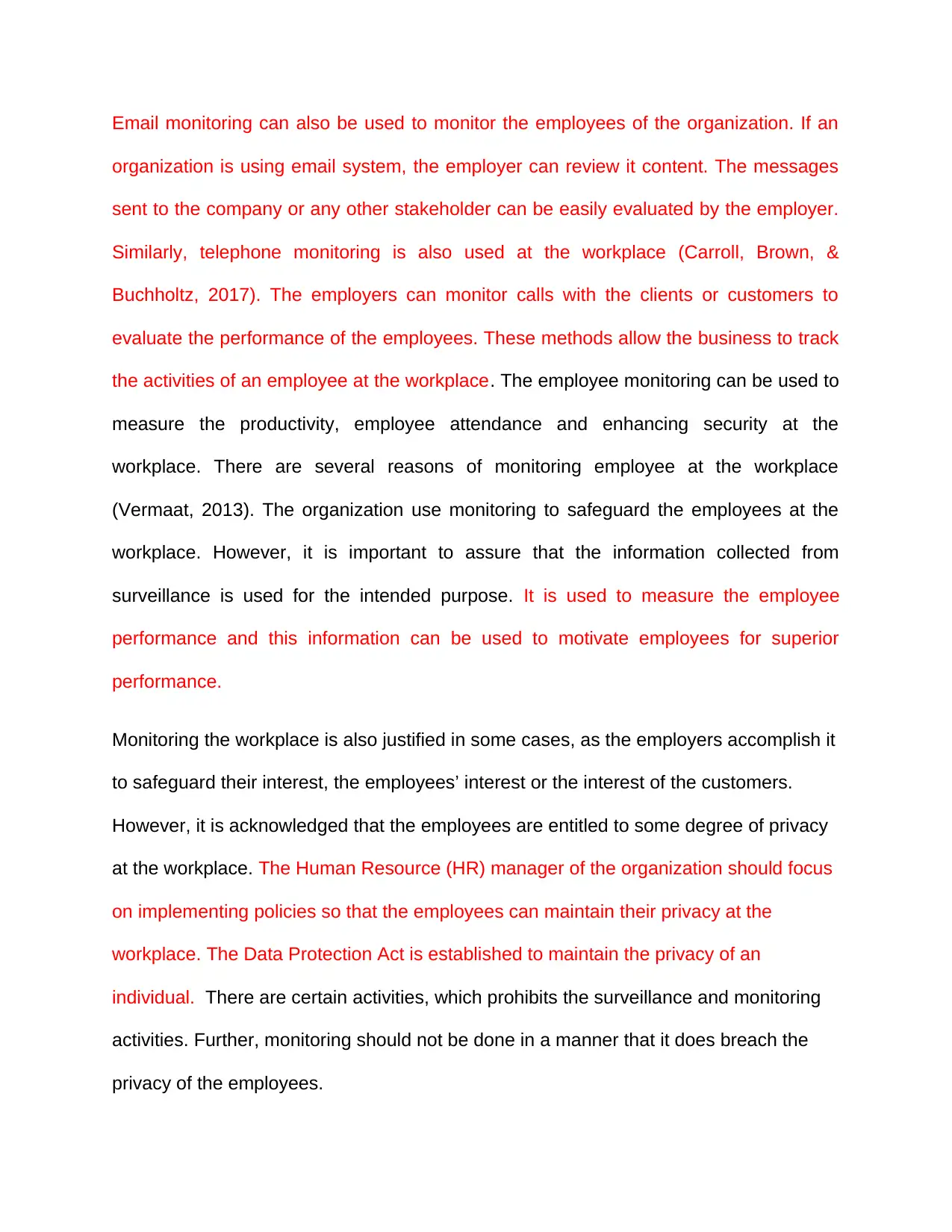
Email monitoring can also be used to monitor the employees of the organization. If an
organization is using email system, the employer can review it content. The messages
sent to the company or any other stakeholder can be easily evaluated by the employer.
Similarly, telephone monitoring is also used at the workplace (Carroll, Brown, &
Buchholtz, 2017). The employers can monitor calls with the clients or customers to
evaluate the performance of the employees. These methods allow the business to track
the activities of an employee at the workplace. The employee monitoring can be used to
measure the productivity, employee attendance and enhancing security at the
workplace. There are several reasons of monitoring employee at the workplace
(Vermaat, 2013). The organization use monitoring to safeguard the employees at the
workplace. However, it is important to assure that the information collected from
surveillance is used for the intended purpose. It is used to measure the employee
performance and this information can be used to motivate employees for superior
performance.
Monitoring the workplace is also justified in some cases, as the employers accomplish it
to safeguard their interest, the employees’ interest or the interest of the customers.
However, it is acknowledged that the employees are entitled to some degree of privacy
at the workplace. The Human Resource (HR) manager of the organization should focus
on implementing policies so that the employees can maintain their privacy at the
workplace. The Data Protection Act is established to maintain the privacy of an
individual. There are certain activities, which prohibits the surveillance and monitoring
activities. Further, monitoring should not be done in a manner that it does breach the
privacy of the employees.
organization is using email system, the employer can review it content. The messages
sent to the company or any other stakeholder can be easily evaluated by the employer.
Similarly, telephone monitoring is also used at the workplace (Carroll, Brown, &
Buchholtz, 2017). The employers can monitor calls with the clients or customers to
evaluate the performance of the employees. These methods allow the business to track
the activities of an employee at the workplace. The employee monitoring can be used to
measure the productivity, employee attendance and enhancing security at the
workplace. There are several reasons of monitoring employee at the workplace
(Vermaat, 2013). The organization use monitoring to safeguard the employees at the
workplace. However, it is important to assure that the information collected from
surveillance is used for the intended purpose. It is used to measure the employee
performance and this information can be used to motivate employees for superior
performance.
Monitoring the workplace is also justified in some cases, as the employers accomplish it
to safeguard their interest, the employees’ interest or the interest of the customers.
However, it is acknowledged that the employees are entitled to some degree of privacy
at the workplace. The Human Resource (HR) manager of the organization should focus
on implementing policies so that the employees can maintain their privacy at the
workplace. The Data Protection Act is established to maintain the privacy of an
individual. There are certain activities, which prohibits the surveillance and monitoring
activities. Further, monitoring should not be done in a manner that it does breach the
privacy of the employees.

The structure of an organization influences the extent of employee monitoring. In flat
organization, the employee monitoring is challenging in comparison to the hierarchical
organization structure. In tall hierarchical structure, there are several layers of
management between the frontline employees and the higher management. On the
other hand, the flat structure denotes an organization, where there are only a very few
layers in the organization. In tall structures, there is an opportunity for better supervision
(Martin & Freeman, 2003). In flat organization structures, the number of employees
reporting to each manager is high which provide high level of freedom to each
employee.
In the recent years, there has been a significant controversy related to workplace
monitoring getting too personal and intruding the privacy of the customers. The current
methods are going beyond the traditional methods as they emphasize the use of
portable devices for monitoring the employees. Recently, Amazon has won the patents
for high wrist bands, which will be used to promote the e-commerce warehouse and
distribution staffs. These devices are used to track the hand movements of the workers
as they fill the warehouse of the organization (Marotti, 2018).
Moreover, there are a few companies which are trying to develop devices, which can be
implanted under the skin of the employees. These microchips can be used to enter high
security area. With this technology, the employees will no longer be required to fumble
with electronic cards or passes (Reed, 2018). However, it has reduced the employee
productivity and satisfaction with the organization. Monitoring reduces the engagement
of the employees with the organization (Reed, 2018). The organization can reduce the
resistance of surveillance by educating the staff regarding its need.
organization, the employee monitoring is challenging in comparison to the hierarchical
organization structure. In tall hierarchical structure, there are several layers of
management between the frontline employees and the higher management. On the
other hand, the flat structure denotes an organization, where there are only a very few
layers in the organization. In tall structures, there is an opportunity for better supervision
(Martin & Freeman, 2003). In flat organization structures, the number of employees
reporting to each manager is high which provide high level of freedom to each
employee.
In the recent years, there has been a significant controversy related to workplace
monitoring getting too personal and intruding the privacy of the customers. The current
methods are going beyond the traditional methods as they emphasize the use of
portable devices for monitoring the employees. Recently, Amazon has won the patents
for high wrist bands, which will be used to promote the e-commerce warehouse and
distribution staffs. These devices are used to track the hand movements of the workers
as they fill the warehouse of the organization (Marotti, 2018).
Moreover, there are a few companies which are trying to develop devices, which can be
implanted under the skin of the employees. These microchips can be used to enter high
security area. With this technology, the employees will no longer be required to fumble
with electronic cards or passes (Reed, 2018). However, it has reduced the employee
productivity and satisfaction with the organization. Monitoring reduces the engagement
of the employees with the organization (Reed, 2018). The organization can reduce the
resistance of surveillance by educating the staff regarding its need.
⊘ This is a preview!⊘
Do you want full access?
Subscribe today to unlock all pages.

Trusted by 1+ million students worldwide
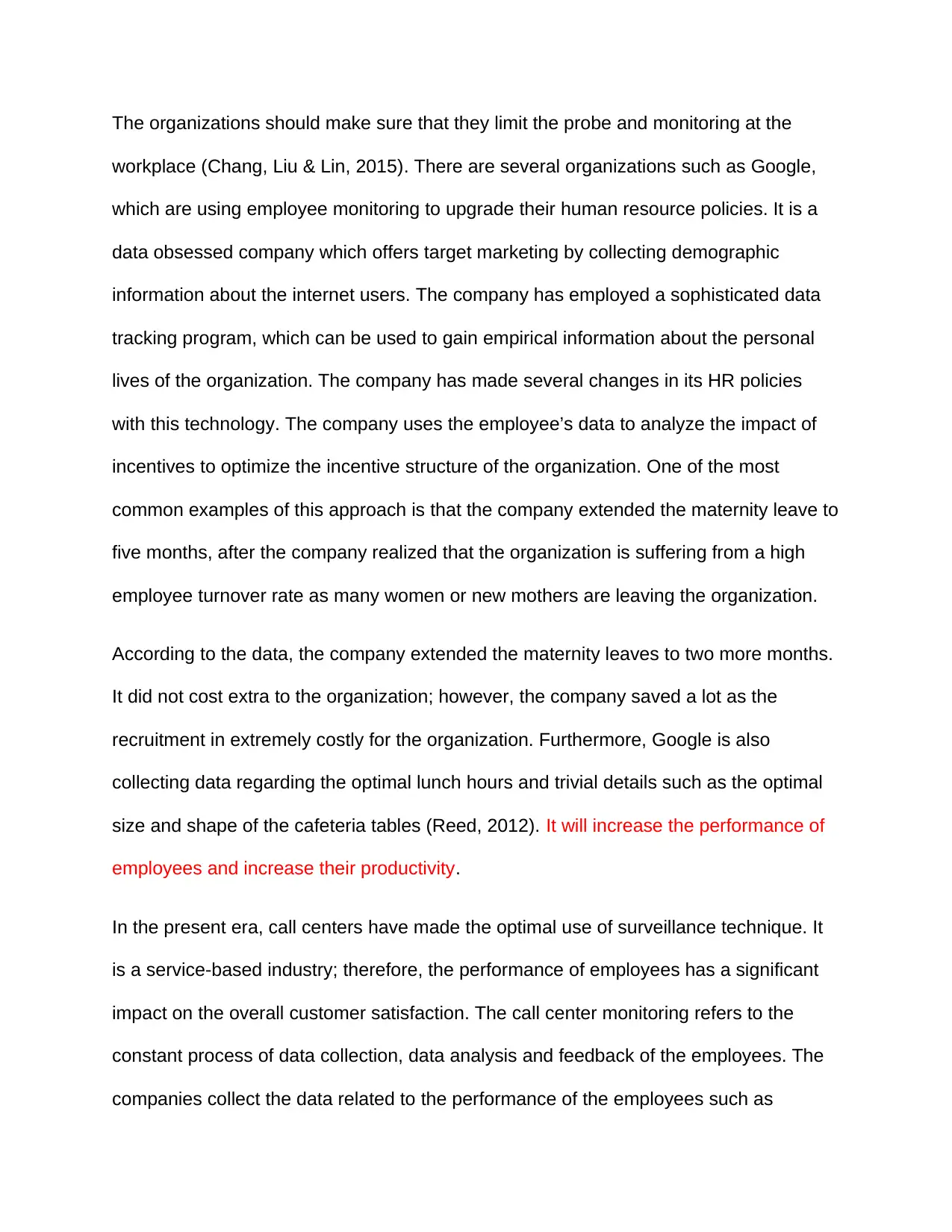
The organizations should make sure that they limit the probe and monitoring at the
workplace (Chang, Liu & Lin, 2015). There are several organizations such as Google,
which are using employee monitoring to upgrade their human resource policies. It is a
data obsessed company which offers target marketing by collecting demographic
information about the internet users. The company has employed a sophisticated data
tracking program, which can be used to gain empirical information about the personal
lives of the organization. The company has made several changes in its HR policies
with this technology. The company uses the employee’s data to analyze the impact of
incentives to optimize the incentive structure of the organization. One of the most
common examples of this approach is that the company extended the maternity leave to
five months, after the company realized that the organization is suffering from a high
employee turnover rate as many women or new mothers are leaving the organization.
According to the data, the company extended the maternity leaves to two more months.
It did not cost extra to the organization; however, the company saved a lot as the
recruitment in extremely costly for the organization. Furthermore, Google is also
collecting data regarding the optimal lunch hours and trivial details such as the optimal
size and shape of the cafeteria tables (Reed, 2012). It will increase the performance of
employees and increase their productivity.
In the present era, call centers have made the optimal use of surveillance technique. It
is a service-based industry; therefore, the performance of employees has a significant
impact on the overall customer satisfaction. The call center monitoring refers to the
constant process of data collection, data analysis and feedback of the employees. The
companies collect the data related to the performance of the employees such as
workplace (Chang, Liu & Lin, 2015). There are several organizations such as Google,
which are using employee monitoring to upgrade their human resource policies. It is a
data obsessed company which offers target marketing by collecting demographic
information about the internet users. The company has employed a sophisticated data
tracking program, which can be used to gain empirical information about the personal
lives of the organization. The company has made several changes in its HR policies
with this technology. The company uses the employee’s data to analyze the impact of
incentives to optimize the incentive structure of the organization. One of the most
common examples of this approach is that the company extended the maternity leave to
five months, after the company realized that the organization is suffering from a high
employee turnover rate as many women or new mothers are leaving the organization.
According to the data, the company extended the maternity leaves to two more months.
It did not cost extra to the organization; however, the company saved a lot as the
recruitment in extremely costly for the organization. Furthermore, Google is also
collecting data regarding the optimal lunch hours and trivial details such as the optimal
size and shape of the cafeteria tables (Reed, 2012). It will increase the performance of
employees and increase their productivity.
In the present era, call centers have made the optimal use of surveillance technique. It
is a service-based industry; therefore, the performance of employees has a significant
impact on the overall customer satisfaction. The call center monitoring refers to the
constant process of data collection, data analysis and feedback of the employees. The
companies collect the data related to the performance of the employees such as
Paraphrase This Document
Need a fresh take? Get an instant paraphrase of this document with our AI Paraphraser
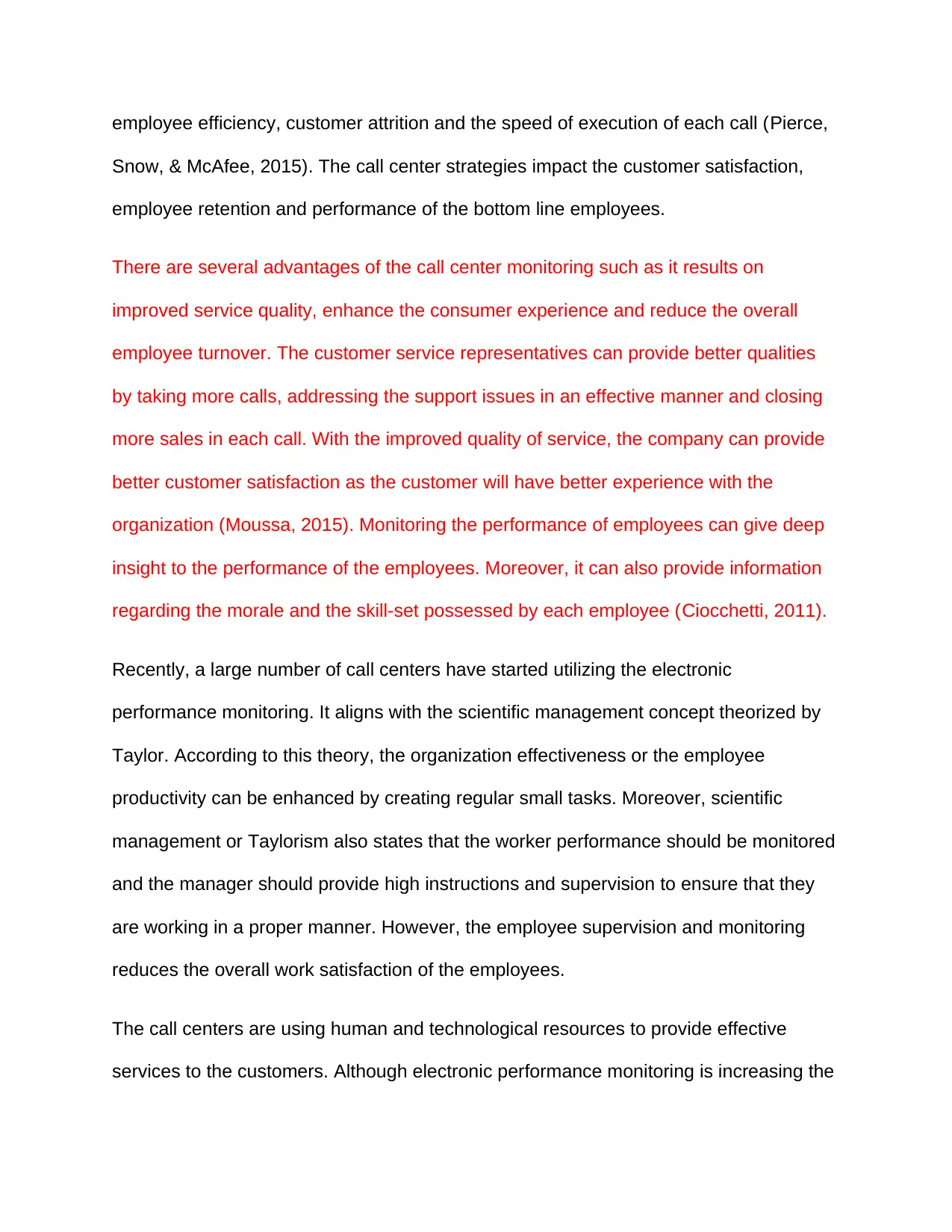
employee efficiency, customer attrition and the speed of execution of each call (Pierce,
Snow, & McAfee, 2015). The call center strategies impact the customer satisfaction,
employee retention and performance of the bottom line employees.
There are several advantages of the call center monitoring such as it results on
improved service quality, enhance the consumer experience and reduce the overall
employee turnover. The customer service representatives can provide better qualities
by taking more calls, addressing the support issues in an effective manner and closing
more sales in each call. With the improved quality of service, the company can provide
better customer satisfaction as the customer will have better experience with the
organization (Moussa, 2015). Monitoring the performance of employees can give deep
insight to the performance of the employees. Moreover, it can also provide information
regarding the morale and the skill-set possessed by each employee (Ciocchetti, 2011).
Recently, a large number of call centers have started utilizing the electronic
performance monitoring. It aligns with the scientific management concept theorized by
Taylor. According to this theory, the organization effectiveness or the employee
productivity can be enhanced by creating regular small tasks. Moreover, scientific
management or Taylorism also states that the worker performance should be monitored
and the manager should provide high instructions and supervision to ensure that they
are working in a proper manner. However, the employee supervision and monitoring
reduces the overall work satisfaction of the employees.
The call centers are using human and technological resources to provide effective
services to the customers. Although electronic performance monitoring is increasing the
Snow, & McAfee, 2015). The call center strategies impact the customer satisfaction,
employee retention and performance of the bottom line employees.
There are several advantages of the call center monitoring such as it results on
improved service quality, enhance the consumer experience and reduce the overall
employee turnover. The customer service representatives can provide better qualities
by taking more calls, addressing the support issues in an effective manner and closing
more sales in each call. With the improved quality of service, the company can provide
better customer satisfaction as the customer will have better experience with the
organization (Moussa, 2015). Monitoring the performance of employees can give deep
insight to the performance of the employees. Moreover, it can also provide information
regarding the morale and the skill-set possessed by each employee (Ciocchetti, 2011).
Recently, a large number of call centers have started utilizing the electronic
performance monitoring. It aligns with the scientific management concept theorized by
Taylor. According to this theory, the organization effectiveness or the employee
productivity can be enhanced by creating regular small tasks. Moreover, scientific
management or Taylorism also states that the worker performance should be monitored
and the manager should provide high instructions and supervision to ensure that they
are working in a proper manner. However, the employee supervision and monitoring
reduces the overall work satisfaction of the employees.
The call centers are using human and technological resources to provide effective
services to the customers. Although electronic performance monitoring is increasing the
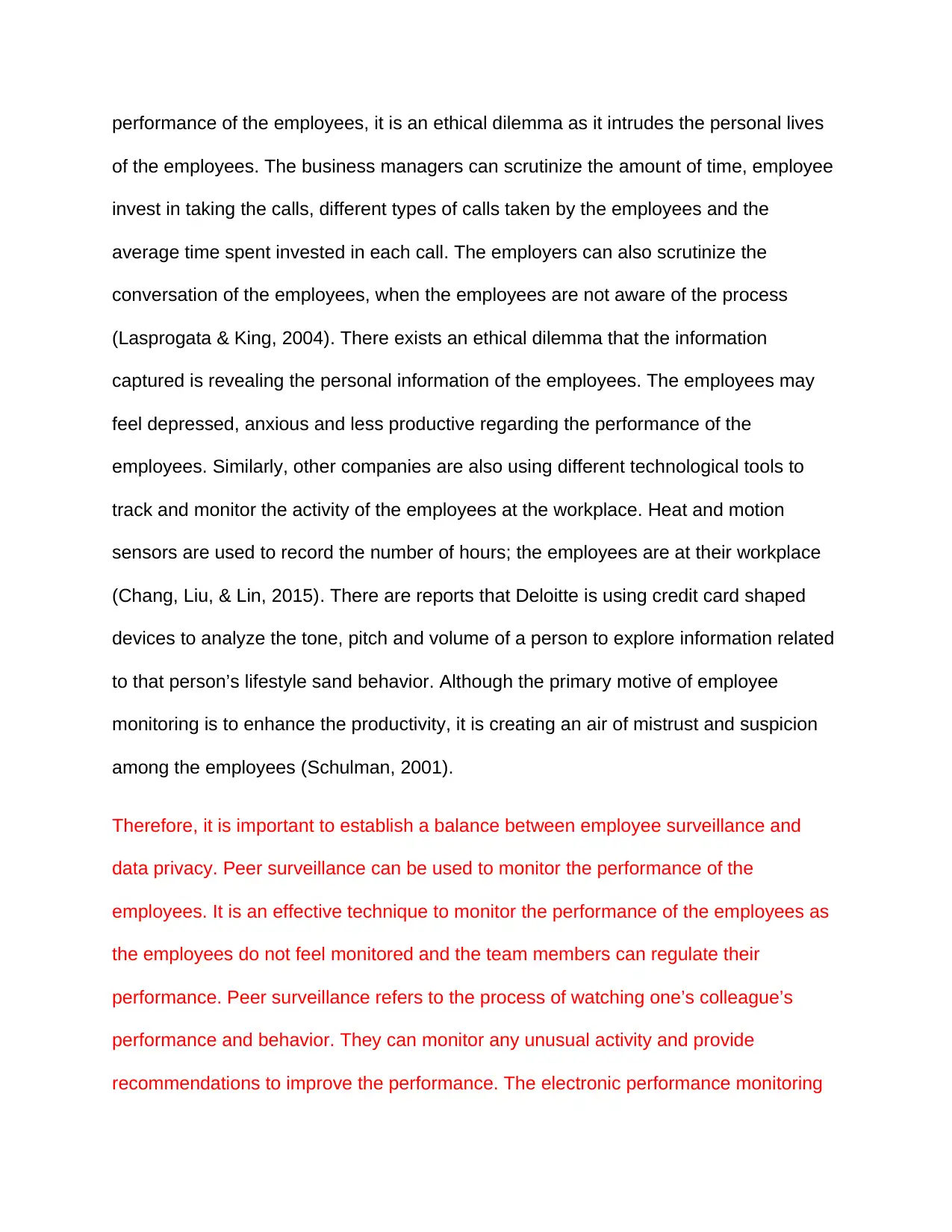
performance of the employees, it is an ethical dilemma as it intrudes the personal lives
of the employees. The business managers can scrutinize the amount of time, employee
invest in taking the calls, different types of calls taken by the employees and the
average time spent invested in each call. The employers can also scrutinize the
conversation of the employees, when the employees are not aware of the process
(Lasprogata & King, 2004). There exists an ethical dilemma that the information
captured is revealing the personal information of the employees. The employees may
feel depressed, anxious and less productive regarding the performance of the
employees. Similarly, other companies are also using different technological tools to
track and monitor the activity of the employees at the workplace. Heat and motion
sensors are used to record the number of hours; the employees are at their workplace
(Chang, Liu, & Lin, 2015). There are reports that Deloitte is using credit card shaped
devices to analyze the tone, pitch and volume of a person to explore information related
to that person’s lifestyle sand behavior. Although the primary motive of employee
monitoring is to enhance the productivity, it is creating an air of mistrust and suspicion
among the employees (Schulman, 2001).
Therefore, it is important to establish a balance between employee surveillance and
data privacy. Peer surveillance can be used to monitor the performance of the
employees. It is an effective technique to monitor the performance of the employees as
the employees do not feel monitored and the team members can regulate their
performance. Peer surveillance refers to the process of watching one’s colleague’s
performance and behavior. They can monitor any unusual activity and provide
recommendations to improve the performance. The electronic performance monitoring
of the employees. The business managers can scrutinize the amount of time, employee
invest in taking the calls, different types of calls taken by the employees and the
average time spent invested in each call. The employers can also scrutinize the
conversation of the employees, when the employees are not aware of the process
(Lasprogata & King, 2004). There exists an ethical dilemma that the information
captured is revealing the personal information of the employees. The employees may
feel depressed, anxious and less productive regarding the performance of the
employees. Similarly, other companies are also using different technological tools to
track and monitor the activity of the employees at the workplace. Heat and motion
sensors are used to record the number of hours; the employees are at their workplace
(Chang, Liu, & Lin, 2015). There are reports that Deloitte is using credit card shaped
devices to analyze the tone, pitch and volume of a person to explore information related
to that person’s lifestyle sand behavior. Although the primary motive of employee
monitoring is to enhance the productivity, it is creating an air of mistrust and suspicion
among the employees (Schulman, 2001).
Therefore, it is important to establish a balance between employee surveillance and
data privacy. Peer surveillance can be used to monitor the performance of the
employees. It is an effective technique to monitor the performance of the employees as
the employees do not feel monitored and the team members can regulate their
performance. Peer surveillance refers to the process of watching one’s colleague’s
performance and behavior. They can monitor any unusual activity and provide
recommendations to improve the performance. The electronic performance monitoring
⊘ This is a preview!⊘
Do you want full access?
Subscribe today to unlock all pages.

Trusted by 1+ million students worldwide
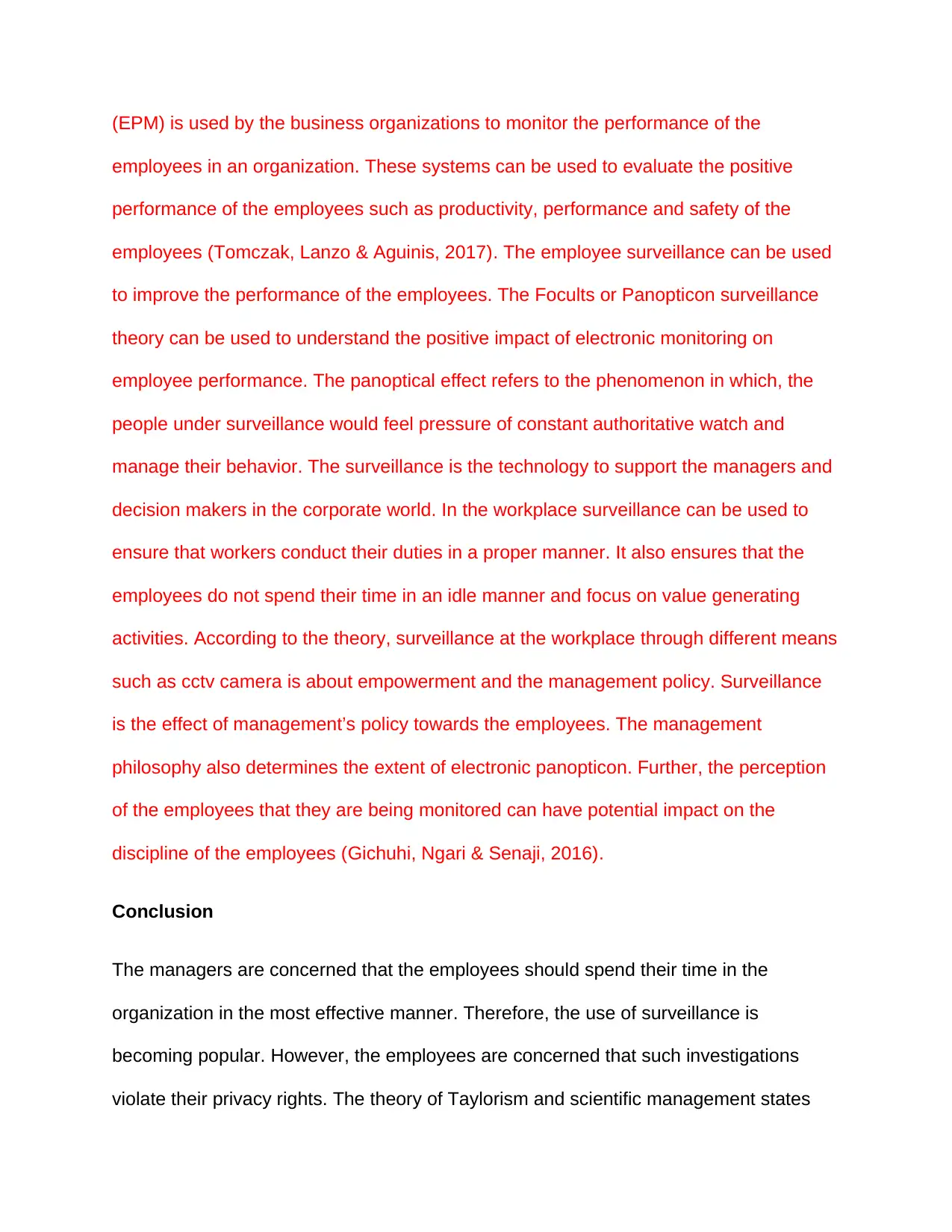
(EPM) is used by the business organizations to monitor the performance of the
employees in an organization. These systems can be used to evaluate the positive
performance of the employees such as productivity, performance and safety of the
employees (Tomczak, Lanzo & Aguinis, 2017). The employee surveillance can be used
to improve the performance of the employees. The Focults or Panopticon surveillance
theory can be used to understand the positive impact of electronic monitoring on
employee performance. The panoptical effect refers to the phenomenon in which, the
people under surveillance would feel pressure of constant authoritative watch and
manage their behavior. The surveillance is the technology to support the managers and
decision makers in the corporate world. In the workplace surveillance can be used to
ensure that workers conduct their duties in a proper manner. It also ensures that the
employees do not spend their time in an idle manner and focus on value generating
activities. According to the theory, surveillance at the workplace through different means
such as cctv camera is about empowerment and the management policy. Surveillance
is the effect of management’s policy towards the employees. The management
philosophy also determines the extent of electronic panopticon. Further, the perception
of the employees that they are being monitored can have potential impact on the
discipline of the employees (Gichuhi, Ngari & Senaji, 2016).
Conclusion
The managers are concerned that the employees should spend their time in the
organization in the most effective manner. Therefore, the use of surveillance is
becoming popular. However, the employees are concerned that such investigations
violate their privacy rights. The theory of Taylorism and scientific management states
employees in an organization. These systems can be used to evaluate the positive
performance of the employees such as productivity, performance and safety of the
employees (Tomczak, Lanzo & Aguinis, 2017). The employee surveillance can be used
to improve the performance of the employees. The Focults or Panopticon surveillance
theory can be used to understand the positive impact of electronic monitoring on
employee performance. The panoptical effect refers to the phenomenon in which, the
people under surveillance would feel pressure of constant authoritative watch and
manage their behavior. The surveillance is the technology to support the managers and
decision makers in the corporate world. In the workplace surveillance can be used to
ensure that workers conduct their duties in a proper manner. It also ensures that the
employees do not spend their time in an idle manner and focus on value generating
activities. According to the theory, surveillance at the workplace through different means
such as cctv camera is about empowerment and the management policy. Surveillance
is the effect of management’s policy towards the employees. The management
philosophy also determines the extent of electronic panopticon. Further, the perception
of the employees that they are being monitored can have potential impact on the
discipline of the employees (Gichuhi, Ngari & Senaji, 2016).
Conclusion
The managers are concerned that the employees should spend their time in the
organization in the most effective manner. Therefore, the use of surveillance is
becoming popular. However, the employees are concerned that such investigations
violate their privacy rights. The theory of Taylorism and scientific management states
Paraphrase This Document
Need a fresh take? Get an instant paraphrase of this document with our AI Paraphraser
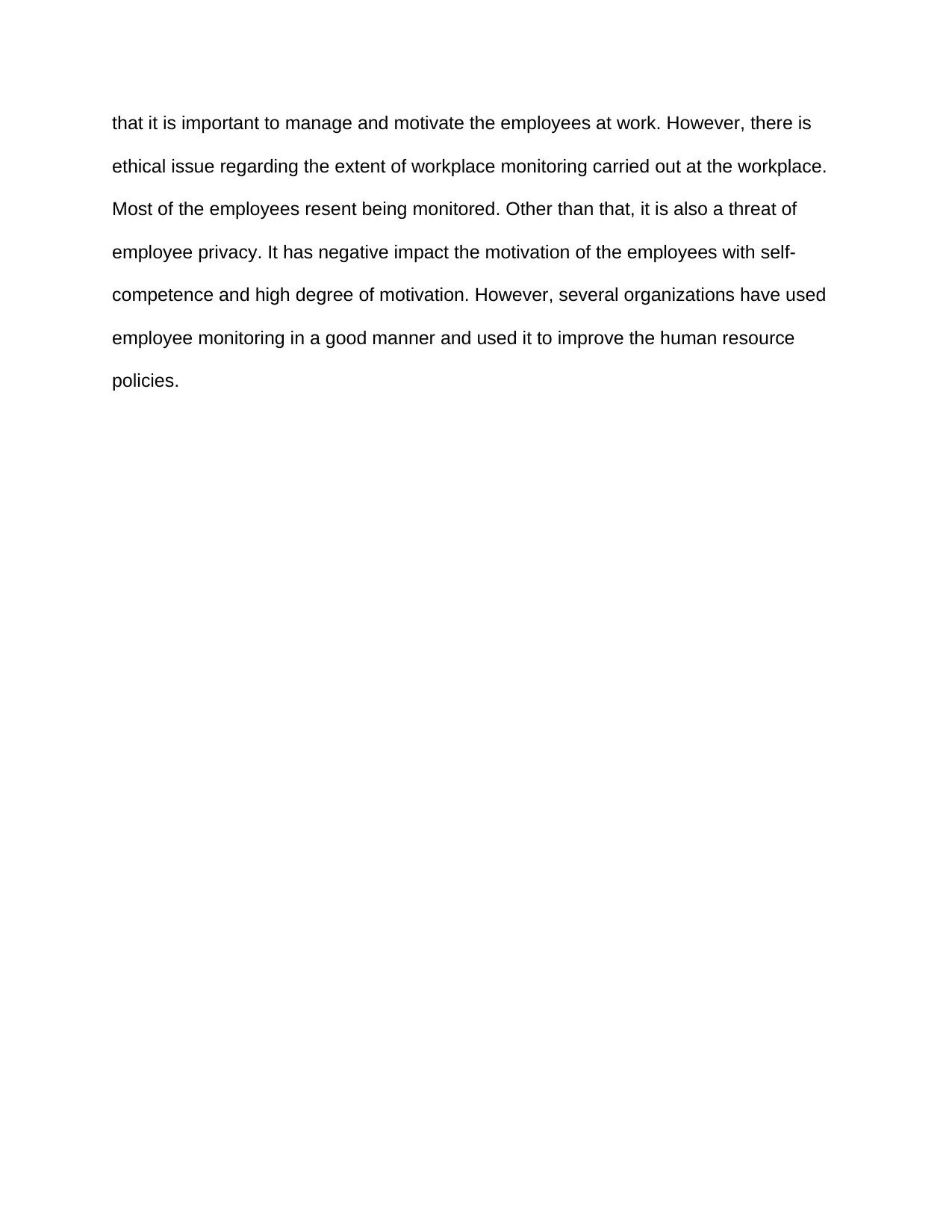
that it is important to manage and motivate the employees at work. However, there is
ethical issue regarding the extent of workplace monitoring carried out at the workplace.
Most of the employees resent being monitored. Other than that, it is also a threat of
employee privacy. It has negative impact the motivation of the employees with self-
competence and high degree of motivation. However, several organizations have used
employee monitoring in a good manner and used it to improve the human resource
policies.
ethical issue regarding the extent of workplace monitoring carried out at the workplace.
Most of the employees resent being monitored. Other than that, it is also a threat of
employee privacy. It has negative impact the motivation of the employees with self-
competence and high degree of motivation. However, several organizations have used
employee monitoring in a good manner and used it to improve the human resource
policies.
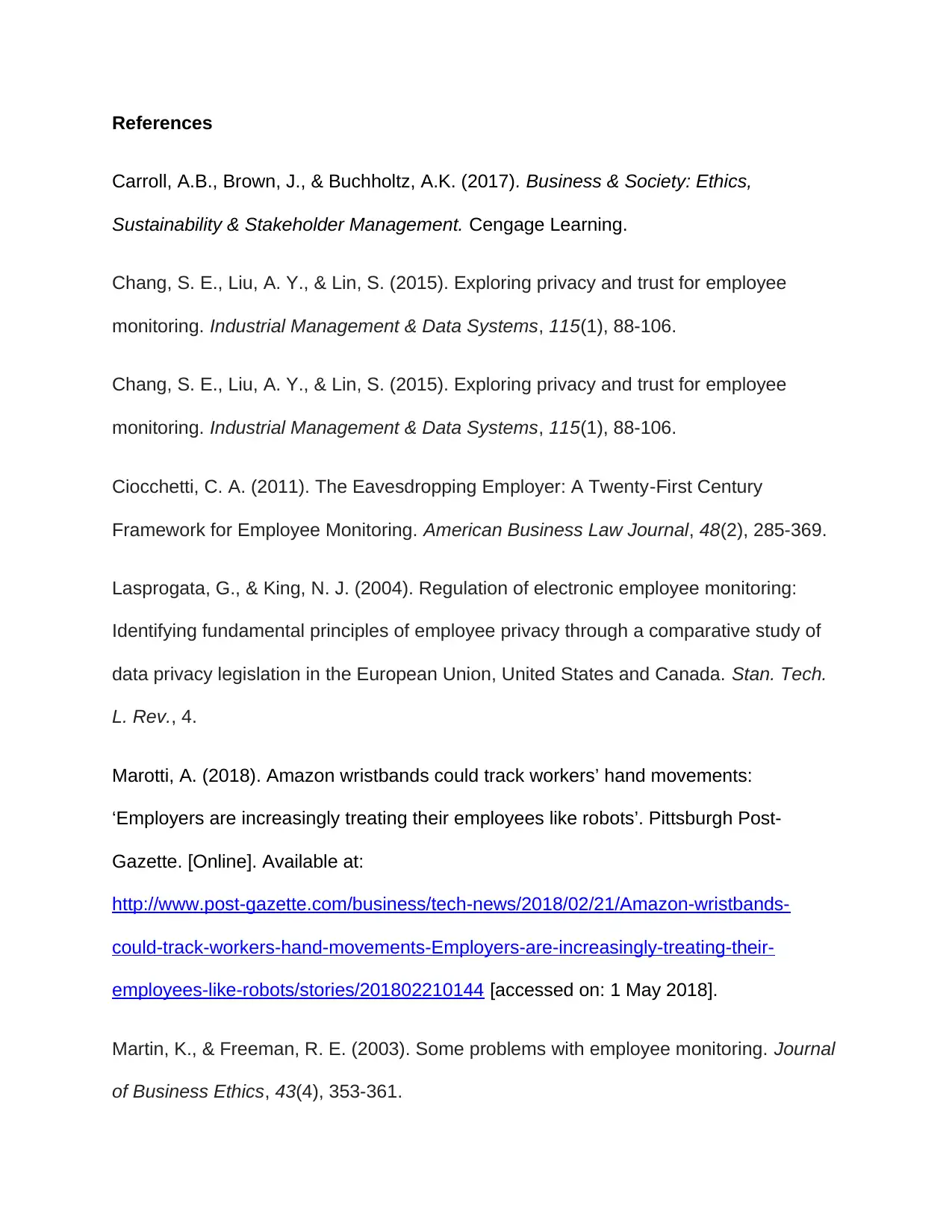
References
Carroll, A.B., Brown, J., & Buchholtz, A.K. (2017). Business & Society: Ethics,
Sustainability & Stakeholder Management. Cengage Learning.
Chang, S. E., Liu, A. Y., & Lin, S. (2015). Exploring privacy and trust for employee
monitoring. Industrial Management & Data Systems, 115(1), 88-106.
Chang, S. E., Liu, A. Y., & Lin, S. (2015). Exploring privacy and trust for employee
monitoring. Industrial Management & Data Systems, 115(1), 88-106.
Ciocchetti, C. A. (2011). The Eavesdropping Employer: A Twenty‐First Century
Framework for Employee Monitoring. American Business Law Journal, 48(2), 285-369.
Lasprogata, G., & King, N. J. (2004). Regulation of electronic employee monitoring:
Identifying fundamental principles of employee privacy through a comparative study of
data privacy legislation in the European Union, United States and Canada. Stan. Tech.
L. Rev., 4.
Marotti, A. (2018). Amazon wristbands could track workers’ hand movements:
‘Employers are increasingly treating their employees like robots’. Pittsburgh Post-
Gazette. [Online]. Available at:
http://www.post-gazette.com/business/tech-news/2018/02/21/Amazon-wristbands-
could-track-workers-hand-movements-Employers-are-increasingly-treating-their-
employees-like-robots/stories/201802210144 [accessed on: 1 May 2018].
Martin, K., & Freeman, R. E. (2003). Some problems with employee monitoring. Journal
of Business Ethics, 43(4), 353-361.
Carroll, A.B., Brown, J., & Buchholtz, A.K. (2017). Business & Society: Ethics,
Sustainability & Stakeholder Management. Cengage Learning.
Chang, S. E., Liu, A. Y., & Lin, S. (2015). Exploring privacy and trust for employee
monitoring. Industrial Management & Data Systems, 115(1), 88-106.
Chang, S. E., Liu, A. Y., & Lin, S. (2015). Exploring privacy and trust for employee
monitoring. Industrial Management & Data Systems, 115(1), 88-106.
Ciocchetti, C. A. (2011). The Eavesdropping Employer: A Twenty‐First Century
Framework for Employee Monitoring. American Business Law Journal, 48(2), 285-369.
Lasprogata, G., & King, N. J. (2004). Regulation of electronic employee monitoring:
Identifying fundamental principles of employee privacy through a comparative study of
data privacy legislation in the European Union, United States and Canada. Stan. Tech.
L. Rev., 4.
Marotti, A. (2018). Amazon wristbands could track workers’ hand movements:
‘Employers are increasingly treating their employees like robots’. Pittsburgh Post-
Gazette. [Online]. Available at:
http://www.post-gazette.com/business/tech-news/2018/02/21/Amazon-wristbands-
could-track-workers-hand-movements-Employers-are-increasingly-treating-their-
employees-like-robots/stories/201802210144 [accessed on: 1 May 2018].
Martin, K., & Freeman, R. E. (2003). Some problems with employee monitoring. Journal
of Business Ethics, 43(4), 353-361.
⊘ This is a preview!⊘
Do you want full access?
Subscribe today to unlock all pages.

Trusted by 1+ million students worldwide
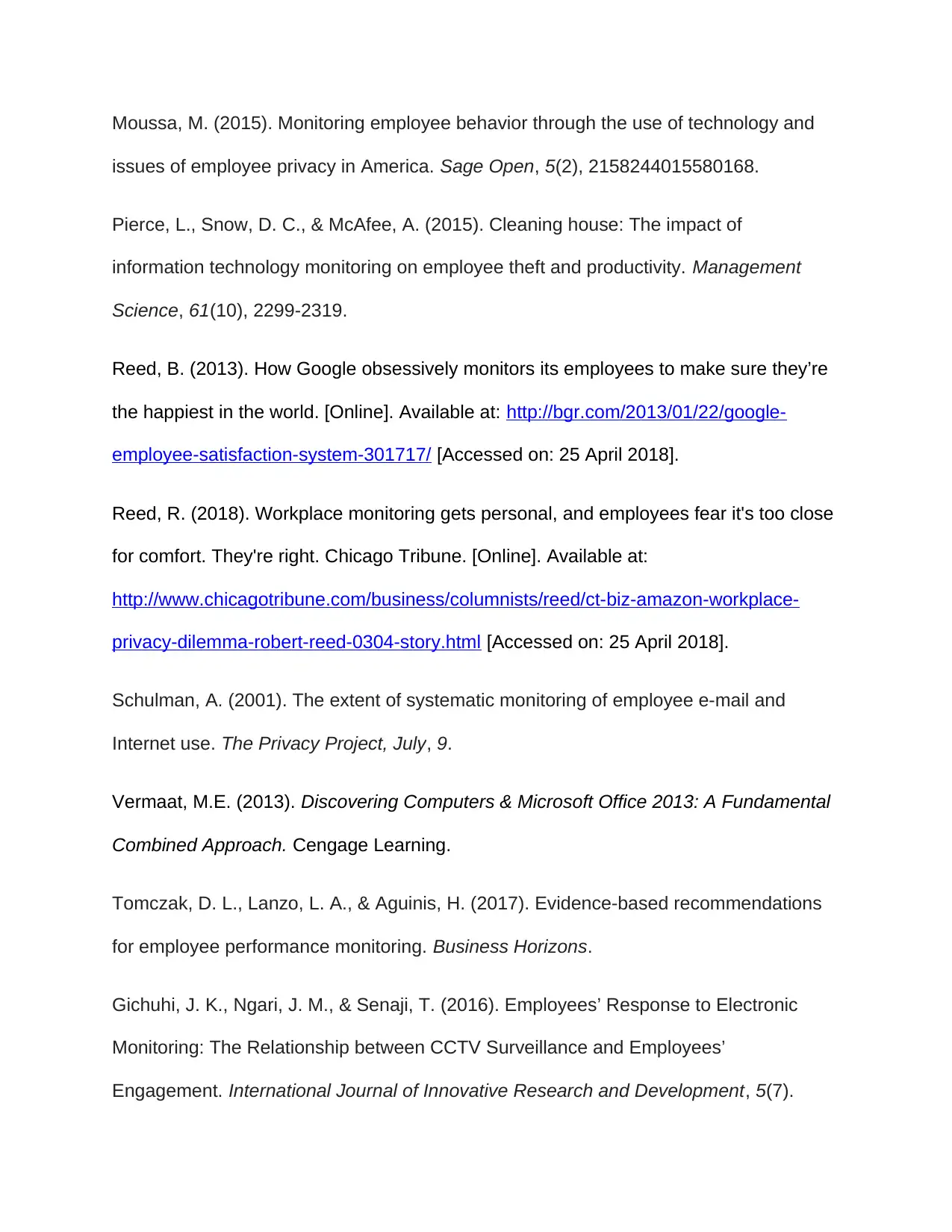
Moussa, M. (2015). Monitoring employee behavior through the use of technology and
issues of employee privacy in America. Sage Open, 5(2), 2158244015580168.
Pierce, L., Snow, D. C., & McAfee, A. (2015). Cleaning house: The impact of
information technology monitoring on employee theft and productivity. Management
Science, 61(10), 2299-2319.
Reed, B. (2013). How Google obsessively monitors its employees to make sure they’re
the happiest in the world. [Online]. Available at: http://bgr.com/2013/01/22/google-
employee-satisfaction-system-301717/ [Accessed on: 25 April 2018].
Reed, R. (2018). Workplace monitoring gets personal, and employees fear it's too close
for comfort. They're right. Chicago Tribune. [Online]. Available at:
http://www.chicagotribune.com/business/columnists/reed/ct-biz-amazon-workplace-
privacy-dilemma-robert-reed-0304-story.html [Accessed on: 25 April 2018].
Schulman, A. (2001). The extent of systematic monitoring of employee e-mail and
Internet use. The Privacy Project, July, 9.
Vermaat, M.E. (2013). Discovering Computers & Microsoft Office 2013: A Fundamental
Combined Approach. Cengage Learning.
Tomczak, D. L., Lanzo, L. A., & Aguinis, H. (2017). Evidence-based recommendations
for employee performance monitoring. Business Horizons.
Gichuhi, J. K., Ngari, J. M., & Senaji, T. (2016). Employees’ Response to Electronic
Monitoring: The Relationship between CCTV Surveillance and Employees’
Engagement. International Journal of Innovative Research and Development, 5(7).
issues of employee privacy in America. Sage Open, 5(2), 2158244015580168.
Pierce, L., Snow, D. C., & McAfee, A. (2015). Cleaning house: The impact of
information technology monitoring on employee theft and productivity. Management
Science, 61(10), 2299-2319.
Reed, B. (2013). How Google obsessively monitors its employees to make sure they’re
the happiest in the world. [Online]. Available at: http://bgr.com/2013/01/22/google-
employee-satisfaction-system-301717/ [Accessed on: 25 April 2018].
Reed, R. (2018). Workplace monitoring gets personal, and employees fear it's too close
for comfort. They're right. Chicago Tribune. [Online]. Available at:
http://www.chicagotribune.com/business/columnists/reed/ct-biz-amazon-workplace-
privacy-dilemma-robert-reed-0304-story.html [Accessed on: 25 April 2018].
Schulman, A. (2001). The extent of systematic monitoring of employee e-mail and
Internet use. The Privacy Project, July, 9.
Vermaat, M.E. (2013). Discovering Computers & Microsoft Office 2013: A Fundamental
Combined Approach. Cengage Learning.
Tomczak, D. L., Lanzo, L. A., & Aguinis, H. (2017). Evidence-based recommendations
for employee performance monitoring. Business Horizons.
Gichuhi, J. K., Ngari, J. M., & Senaji, T. (2016). Employees’ Response to Electronic
Monitoring: The Relationship between CCTV Surveillance and Employees’
Engagement. International Journal of Innovative Research and Development, 5(7).
1 out of 10
Related Documents
Your All-in-One AI-Powered Toolkit for Academic Success.
+13062052269
info@desklib.com
Available 24*7 on WhatsApp / Email
![[object Object]](/_next/static/media/star-bottom.7253800d.svg)
Unlock your academic potential
Copyright © 2020–2026 A2Z Services. All Rights Reserved. Developed and managed by ZUCOL.





